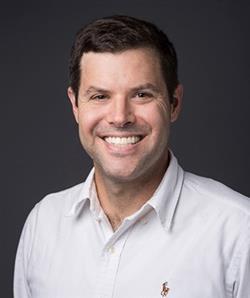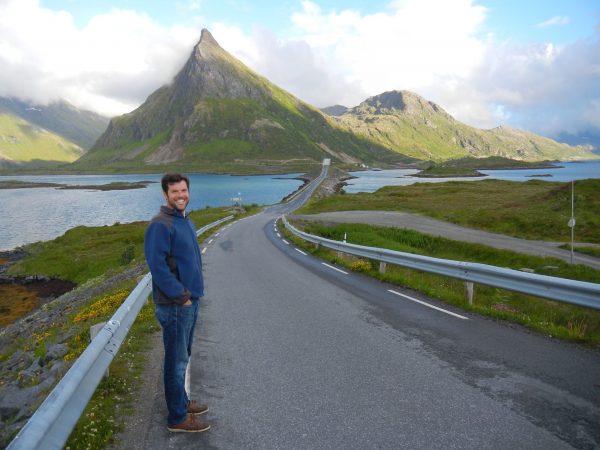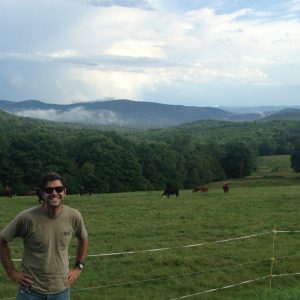After a delay brought on by the pandemic, this fall semester marks the official launch of the endowed faculty position established by Father Don Willette. Father Don’s pursuit of this position has deep roots as he has always seen a need to reach young people, especially college students. Father Don understands the university as “providing a safe place for young people to question and to wonder.” He believes we ought to “respect this part of life, in which we search for our own identity, wonder out loud, and seek to understand the depths of our being.”

The first faculty member to fill the endowed Willette position is Dr. Douglas Finn, a one-year visiting professor of Catholic studies. For the past ten years, Dr. Finn has taught philosophy and theology in the Catholic intellectual tradition at a variety of colleges and universities, including as Notre Dame, Brown, Boston College, Villanova, and, most recently, at Saint Anselm College.
Dr. Finn’s first book, Life in the Spirit: Trinitarian Grammar and Pneumatic Community in Hegel and Augustine (Notre Dame Press, 2015), bridges his interests in Christian thought of the late antique and modern periods and offers a comparison of two influential thinkers in Western intellectual history—Augustine and Hegel—on their concepts of Spirit. This book is indicative of Dr. Finn’s ability to work across areas of Catholic theology and philosophy, making him well-suited in joining the Philosophy faculty at CSU.
We sat down with Doug to learn more about his research in Catholic theology, his teaching philosophy, and how he hopes to engage the larger Fort Collins community this year.
How did you first become interested in studying Catholic theology?
When I first arrived at college, I was waffling between a philosophy and a religious studies major. As it turned out, the course that best fit my schedule that fall was an introduction to Islam and the religions of India. After a few weeks, I was hooked, and I ended up majoring in religion. The study of comparative religions inspired me to dive into my own Catholic tradition more deeply and with a fresh set of eyes. At the same time, I was impressed with the philosophic density of much religious thought and practice and by the “religious” features of many of the world’s philosophic traditions. In graduate school, therefore, I focused on the long history of Christian thought and practice, especially as it overlapped and interacted with Western philosophical traditions.
What are your research interests, and how may they be relevant to students and community members today?
My current research investigates how several late antique Christian preachers sought, through sophisticated reading and rhetorical strategies, to bring scriptural narratives and moral exemplars to life for their congregations. Preachers like Augustine of Hippo and John Chrysostom were operating in a longer tradition of Greco-Roman medico-philosophical therapy, wherein philosophical teachers functioned as doctors of the soul, and their sermons served as medicine for their congregants’ various spiritual ailments. In other words, the sermons, which were preached during the Christian liturgy and were a primary occasion for the interpretation of scripture, represent one of the concrete means through which church leaders sought to Christianize the late antique Roman world. For better or worse, we in the West today are heirs of the world that these Christian leaders helped create, and it is important for us to know how it was formed.
Yet there are other reasons why this research is relevant to philosophy students and members of the broader community. We see in preachers like Augustine and John Chrysostom a holistic approach to human persons and their moral formation, as individuals and as members of the community. These preachers recognize the intimate connection between rationality and the emotions and desires; accordingly, their homilies demonstrate the inextricable link between the form a speech or text takes and its theological or philosophical content. Such insights have bearing for those today, whether Christian or not, who are interested in moral pedagogy and the cultivation of virtue and character.

What are your aims as a teacher? How do you get students excited about Catholic philosophy or philosophy in general?
As a teacher, I live for those moments of surprise, awe, and wonder—when students discover something unexpected and new about the world around them and about themselves or when the students teach me something new about the world, about themselves, or about myself. Many young people today have, throughout their high school and college careers, grown quite adept at building resumes and checking boxes as they follow the path to “success” set forth for them by family and society. This is an important goal of higher education, and there is nothing inherently wrong with it. Yet the beauty of studying philosophy or religion is that it offers students the chance, beyond any strictly utilitarian imperative, to think critically about the meaning and value of their lives and their education, what the good or goods are that they seek in this life, and what, generally, a good human life looks like to them. I, therefore, try to bring students into contact with perspectives on humanity and human flourishing that they might not have encountered before. The goal is for students to expand their imaginations, to reflect critically on their own and others’ values, commitments, and practices, and to be able to articulate and explain their convictions and actions to others. For students to be able to do so, I strive to welcome the contributions of students with diverse perspectives and experiences.
At the same time, I believe that, as an educator, I have an obligation to bring together theory and practice and to help students do the same. Once again, there is often in this regard exciting and rewarding mutual learning and growth. By showing the connection between theory and practice, I try to bring the subject matter to life for the students. Yet the students also bring their own experiences to bear on their interpretations of the course material. In the process, I frequently come to see issues or texts in a new light or from a different perspective. This is an important reason why I am so excited about the opportunity to teach at Colorado State—a university fundamentally committed to publicly engaged scholarship and education. I hope, in my courses and other forms of outreach, to inspire in students and other members of the community a strong passion for learning and for putting what one learns into service for the benefit of others, especially those in need.
What role should Catholicism play within a public university?
I am very excited about the opportunity to teach in a pluralistic philosophy department at a public university. Of course, the Catholic intellectual tradition and Catholic practices are worthy objects of study. Catholicism has a robust history of reflection on the nature of reality, what it means to be human, and how people ought to design societies so as to ensure human flourishing and the advancement of the common good. This intellectual and social tradition can contribute to the broader conversation at an institution like CSU. Conversely, that conversation can foster critical reflection among Catholics regarding the articulation of their foundational principles and the various ways those principles manifest themselves in practice.

What are some ways you would like to be involved in the Fort Collins community?
It is very special to have public engagement be such a central component of this position, and I look forward to making connections with a diverse array of individuals and groups in Fort Collins and northern Colorado. I hope to serve as a speaker or help organize series of speakers or panel discussions on various topics in the history of Christianity, Catholic social thought, and the relationship between the Catholic tradition and a range of pressing social issues, such as climate change, racial justice, or immigration. I look forward to working not only with Catholic church groups and organizations, but with all members of the community. Toward that end, I would also eagerly help coordinate and participate in interreligious dialogue and interreligious collaboration on various projects in the community. My goal is to help foster greater awareness of and understanding between the diverse array of groups and traditions that make up the Fort Collins community.